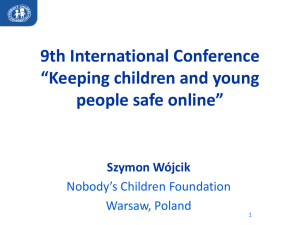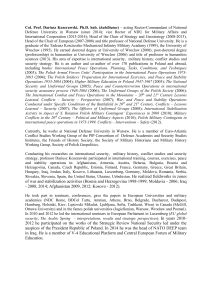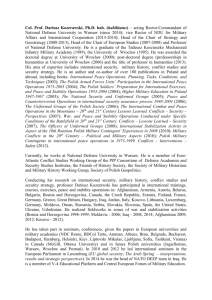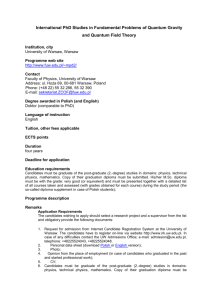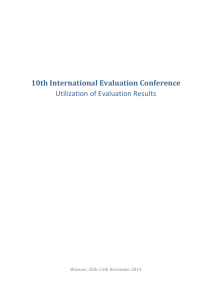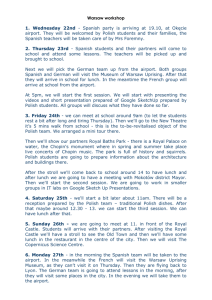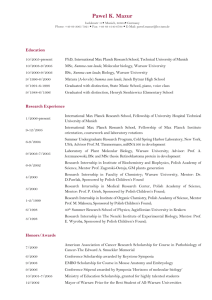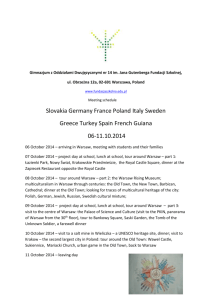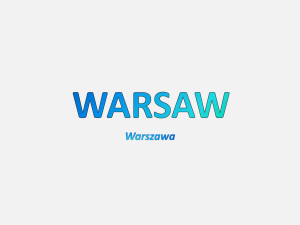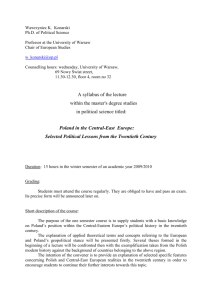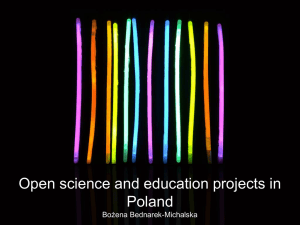programme grid - PL-CALL
advertisement
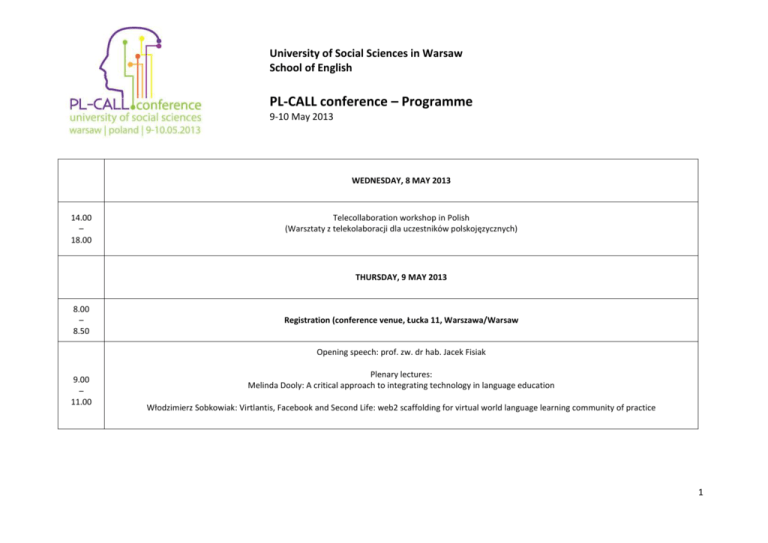
University of Social Sciences in Warsaw School of English PL-CALL conference – Programme 9-10 May 2013 WEDNESDAY, 8 MAY 2013 14.00 – 18.00 Telecollaboration workshop in Polish (Warsztaty z telekolaboracji dla uczestników polskojęzycznych) THURSDAY, 9 MAY 2013 8.00 – 8.50 Registration (conference venue, Łucka 11, Warszawa/Warsaw Opening speech: prof. zw. dr hab. Jacek Fisiak 9.00 – 11.00 Plenary lectures: Melinda Dooly: A critical approach to integrating technology in language education Włodzimierz Sobkowiak: Virtlantis, Facebook and Second Life: web2 scaffolding for virtual world language learning community of practice 1 University of Social Sciences in Warsaw School of English PL-CALL conference – Programme 9-10 May 2013 11.00 – 11.30 11.30 – 14.00 COFFEE BREAK SESSION 1 A: The intercultural perspective / telecollaboration SESSION 1 B: Game-based learning SESSION 1 C: Skill development: reading and writing ‘Not only inter-culturally but also intellectually challenging’: Evaluating interactions in an online discussion forum – Marie-Thérèse Batardière Teaching English articles to Polish students using Games Based Learning – Gillian Edward Going multimodal – A design approach to writing essays – Anna Rolińska E-LOCAL - new possibility in e-courses – Karolina Ruta The challenge of English for lingua-franca purposes – and blended learning solutions – Andreas Glombitza An e-reading course for the development of specific academic skills. How can students of geography benefit? – Yuliya Asotska-Wierzba Promoting Language and Intercultural Awareness through E-tandem Exchanges of Chinese and English: an Exploratory Study – Wei Tan New technologies and classroom interaction. Computer-enhanced ludic techniques in language learning – Krzysztof Kotuła Session 1D: Polish as a foreign language in CALL Designing and sequencing tasks for sociallynetworked learners - Małgorzata Kurek Developing plurilingualism – requirements for specific language learning materials – Antje Neuhoff, Karin Schöne Multimedia presentations on Polish language courses for foreigners – Emilia Danowska-Florczyk Pronunciation training in Polish L2 using a CAPT system AzAR – Agnieszka Wagner CALL vs. traditional grammar instruction– Mariusz Kruk (presentation in Polish) 2 University of Social Sciences in Warsaw School of English PL-CALL conference – Programme 9-10 May 2013 14.00 – 15.00 15.00 – 16.30 16.30 – 17.00 LUNCH SESSION 2 A: Skill development: speaking SESSION 2 B: Skill development: translation and interpreting SESSION 2 C: The discourse perspective New ways of practicing and evaluating oral production – Dominika Bucko IVY English Corpus – a tool supporting interpreter training – Daria Maria Domagała, Eberhard-Karls Expanding the definition of confluence. A corpusbased study of advanced learners' spoken language – Marek Molenda, Piotr Pęzik SpeakApps – new tools for teaching oral interaction in a foreign language – Prizel-Kania Adriana Computer assisted translation and interpretation training – Beata Kukiełka-Król, Monika ZiębaPlebankiewicz Dialogue activities for Computer-Assisted Language Learning – Magdalena Wolska, Andrea Horbach, Diana Steffen, Manfred Pinkal New techniques – new contexts – new methodologies? Computer Aided Learning in Chinese-English Conference Interpreting – Yukteshwar Kumar Using PoS-grams to discover phraseology in newspaper articles – Antonio Pinna, David Brett Discourse features in multimodal virtual language learning environments – Michał Lisecki COFFEE BREAK 3 University of Social Sciences in Warsaw School of English PL-CALL conference – Programme 9-10 May 2013 17.00 – 19.00 SESSION 3 A: The school practitioner’s perspective SESSION 3 B: Course design / material writing SESSION 3 C: Language corpora in teacher training E- material writing for Polish middle school learners of English – a case study – Agnieszka Gadomska How to design e-learning courses– Elżbieta Koralewska Collocational profiles as discovery learning – Milena Hebal-Jezierska Implementations of ICTs in the English classrooms of Polish rural primary and junior secondary schools: a pilot study – Marcin Kleban Quality in E-Language Teaching and Learning in the Polish Tertiary Education Context – Małgorzata Świerk A teacher-training course on the use of corpora in language teaching and learning: Perspectives from the students – Agnieszka Leńko-Szymańska Teacher of the new millennium – about innovations in ICT – Anna Kowalik The e-learning component of a blended learning course – Edyta Olejarczuk Corpus studies as a prerequisite to e-materials development for business English students – Elżbieta Jendrych An E-learning Supplement to a Teacher Training Course: the Trainees’ Perspective – Mariusz Marczak Challenges and opportunities of designing a ebClass course in Irish – Wojciech Malec SESSION 3 D: Skill development: pronunciation Computer-assisted awareness raising of L2 phonology: pronunciation in commercials – a pilot study – Hanna Dziczek-Karlikowska, Beata Mikołajewska 4 University of Social Sciences in Warsaw School of English PL-CALL conference – Programme 9-10 May 2013 19.30+ Conference dinner and Warsaw by night FRIDAY, 10 MAY 2013 Plenary lectures: 9.00 – 11.00 11.00 – 11.30 Mirjam Hauck: Empowering students in digital environments: promoting a critical use of online language learning tools and applications Andreas Müller-Hartman: A task is a task is a task? – designing and structuring telecollaborative learning environments COFFEE BREAK 5 University of Social Sciences in Warsaw School of English PL-CALL conference – Programme 9-10 May 2013 SESSION 4 A: The Internet from the psychological perspective The cyberspace as the new educational environment of contemporary young people – Anita Karyń 11.30 – 13.30 Learners’ usability of Internet-augmented inclass learning – Maciej Pokornowski, Katarzyna Rogalska SESSION 4 C: Testing and feedback tools Using Facebook in an educational context: key factors to the building of communities – Catherine Jeanneau New technique, new context, new methodology in (language) learning – example of ARS multimedia methodology – Dorota Kozakiewicz ACQUAINTANCE – MEMBERSHIP – CAMERADERIE. Online group dynamics vis à vis the Five Factor Model of personality – Anna Turula Solutions from within: a “grassroots” persepctive on creating e-learning tools at a university – Michał Remiszewski SESSION 4 D: Learning strategies in CALL Theoretical study on computer assisted language learning: psycholinguistic point of view – Moslemi Nezhad Saieed Needs Analysis in CALL: A study among noncomputer programming language professionals – Maria Chojnacka 14.00 – 15.00 SESSION 4 B: Online classroom dynamics From an e-tutor’s diary – Tomasz Andrzej Walasek, Dorota Morawska-Walasek Developing Learner Autonomy through an ESP Hybrid Course – Anna Stefanowicz-Kocoł, Developing university students' learning strategies in CALL environments – Kamila Burzyńska, Jarosław Krajka Computer mediated training of learner strategies – Rafał Bzdak LUNCH 6 University of Social Sciences in Warsaw School of English PL-CALL conference – Programme 9-10 May 2013 15.00 – 18.00 The English telecollaboration workshop (cont.) (11.30-18.00) Notes: 7

